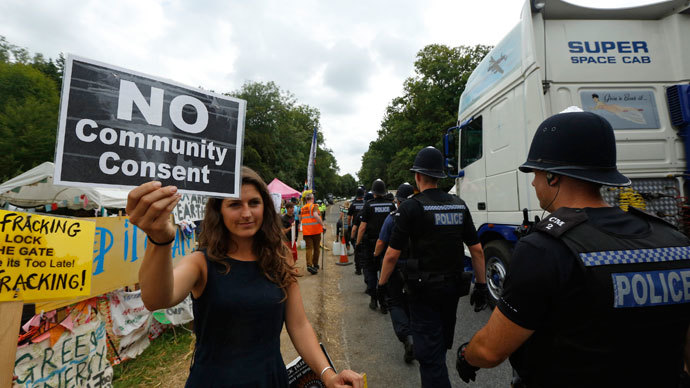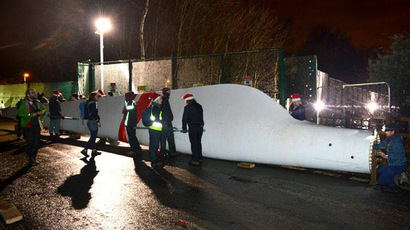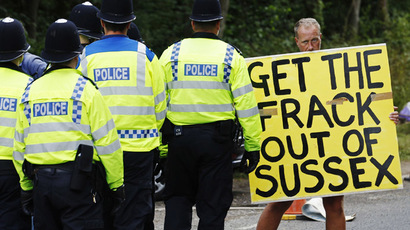Nothing to warn about? UK may legalize fracking under homes without prior warning

Hydraulic fracturing may soon take place under thousands of homes across the United Kingdom without their owners’ knowledge. Based on a proposed law change the burden of notifying homeowners will be lifted from energy companies, the Guardian reports.
Planning Minister Nick Boles said a change in UK law will allow gas companies to put in drilling applications without notifying those in the area whose property could be affected, the Guardian reported. Companies will instead have to post notices in local newspapers and erect site displays in local parishes.
Many opposed to fracking cite potential health risks, air pollution and water contamination, as well as possible earthquakes. Nevertheless, the government portrayed alerting all those possibly impacted by localized fracking as too much of a burden for companies to weather.
It would require a “disproportionately large number of individuals and businesses” to receive notice, said Boles in a statement to MPs.
Hydraulic fracturing, or fracking, is the highly controversial process of injecting water, sand and various chemicals into layers of rock in hopes of releasing oil and gas deep underground. Because it takes place far below ground, the gas companies themselves may not understand exactly where they are drilling.
“The associated underground extraction takes place very deep below the Earth's surface, over a wide geographical area,” Boles said. “As a result, it is often not possible to identify the exact route of any lateral drilling.”
“Without the changes to the secondary legislation, the widely drawn area on planning applications for onshore oil and gas projects would require the notification of a disproportionately large number of individuals and businesses. This would be unnecessarily excessive when other forms of complimentary notification exist.”
Ministers have dismissed any safety or environmental concerns posed by fracking, instead touting the economic benefits while saying any drilling will be done responsibly. Other MPs are nervous about the new edict, The Guardian reported, based on high-profile protests in areas where drilling has been proposed.

On Tuesday the Conservative-led government issued a 49-page energy roadmap outlining ways in which oil and natural gas, including shale deposits, could be exploited in the country.
Britain’s Department of Energy and Climate Change identified new areas across the UK thought to hold rich, untapped stores of shale gas, The Daily Telegraph reported. As part of a new initiative by Westminster, these areas may become subject to test drilling, which could pave the way for fracking if large deposits of shale gas are found.
“The government is keen to explore the potential for shale gas in the UK which could bring major benefit in terms of growth, jobs and energy security,” British Energy Minister Michael Fallon said in a statement. “However we must develop shale responsibly, both for local communities and for the environment.”
In a letter to European Commission President Jose Manuel Barroso made public on Tuesday, Prime Minister David Cameron warned that European Union regulations could stifle investment in Britain’s shale gas industry.
“I am not in favor of new legislation where the lengthy timeframes and significant uncertainty involved are major causes for concern," Cameron wrote in the letter dated December 4, Reuters reports. “The industry in the UK has told us that new EU legislation would immediately delay imminent investment.”
Fracking has met widespread opposition in the UK, with local communities taking to the streets in protest. In the city of Salford, Greater Manchester, activists blocked access to a test drilling site on Monday, placing a 1.5-ton wind turbine blade in front of the Barton Moss facility in what they called a “symbolic” act of protest.
Friends of the Earth campaigner Tony Bosworth called the government’s moves on fracking objectionable given the drilling technique has been identified by officials as having "potentially significant local impacts.”
“People should be notified personally if firms want to drill or frack for oil and gas under their homes. Removing that right is a further blow to local communities who are rightly concerned about the impacts of fracking,” he said. “Ministers should be strengthening rules to protect local people, not weakening them in yet another sop to an industry that wants to keep us hooked on dirty fossil fuels.”
A new report published in the latest edition of the journal Endocrinology shows a dozen chemicals used regularly in fracking are suspected of being endocrine disrupting chemicals, or EDCs — chemicals that can interfere with the human body’s endocrine functions and have been linked to heightened risks of cancer, low fertility rates and decreased sperm quality.














